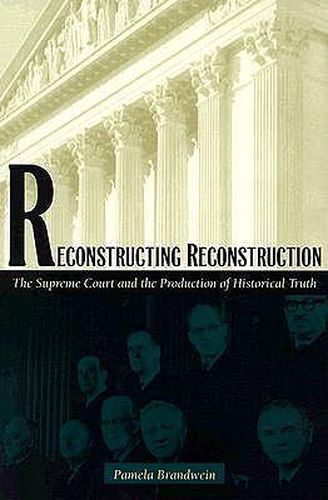Readings Newsletter
Become a Readings Member to make your shopping experience even easier.
Sign in or sign up for free!
You’re not far away from qualifying for FREE standard shipping within Australia
You’ve qualified for FREE standard shipping within Australia
The cart is loading…






Was slavery over when slaves gained formal emancipation? Was it over when the social, economic, and political situation for African Americans no longer mimicked the conditions of slavery? If the Thirteenth Amendment abolished it in 1865, why did most of the disputed points during the Reconstruction debates of 1866-75 concern issues of slavery? In this book Pamela Brandwein examines the post-Civil War struggle between competing political and legal interpretations of slavery and Reconstruction to reveal how accepted historical truth was established.
Delving into the circumstances, assumptions, and rhetoric that shaped the official story of Reconstruction, Brandwein describes precisely how a dominant interpretation of events ultimately emerged and what its implications have been for twentieth-century judicial decisions, particularly for Supreme Court rulings on civil rights. While analyzing interpretive disputes about slavery, Brandwein offers a detailed rescoring of post-Civil War legislative and constitutional history, including analysis of the original understanding of the Fourteenth Amendment. She identifies the perspectives on Reconstruction that were endorsed or rejected by the Supreme Court. Explaining what it meant-theoretically and practically-to resolve Reconstruction debates with a particular definition of slavery, Brandwein recounts how the Northern Democratic definition of ending slavery was not the only definition, just the one that prevailed. Using a familiar historical moment to do new interpretive work, she outlines a sociology of constitutional law, showing how subjective narrative construction can solidify into opaque institutional memory.
$9.00 standard shipping within Australia
FREE standard shipping within Australia for orders over $100.00
Express & International shipping calculated at checkout
Was slavery over when slaves gained formal emancipation? Was it over when the social, economic, and political situation for African Americans no longer mimicked the conditions of slavery? If the Thirteenth Amendment abolished it in 1865, why did most of the disputed points during the Reconstruction debates of 1866-75 concern issues of slavery? In this book Pamela Brandwein examines the post-Civil War struggle between competing political and legal interpretations of slavery and Reconstruction to reveal how accepted historical truth was established.
Delving into the circumstances, assumptions, and rhetoric that shaped the official story of Reconstruction, Brandwein describes precisely how a dominant interpretation of events ultimately emerged and what its implications have been for twentieth-century judicial decisions, particularly for Supreme Court rulings on civil rights. While analyzing interpretive disputes about slavery, Brandwein offers a detailed rescoring of post-Civil War legislative and constitutional history, including analysis of the original understanding of the Fourteenth Amendment. She identifies the perspectives on Reconstruction that were endorsed or rejected by the Supreme Court. Explaining what it meant-theoretically and practically-to resolve Reconstruction debates with a particular definition of slavery, Brandwein recounts how the Northern Democratic definition of ending slavery was not the only definition, just the one that prevailed. Using a familiar historical moment to do new interpretive work, she outlines a sociology of constitutional law, showing how subjective narrative construction can solidify into opaque institutional memory.